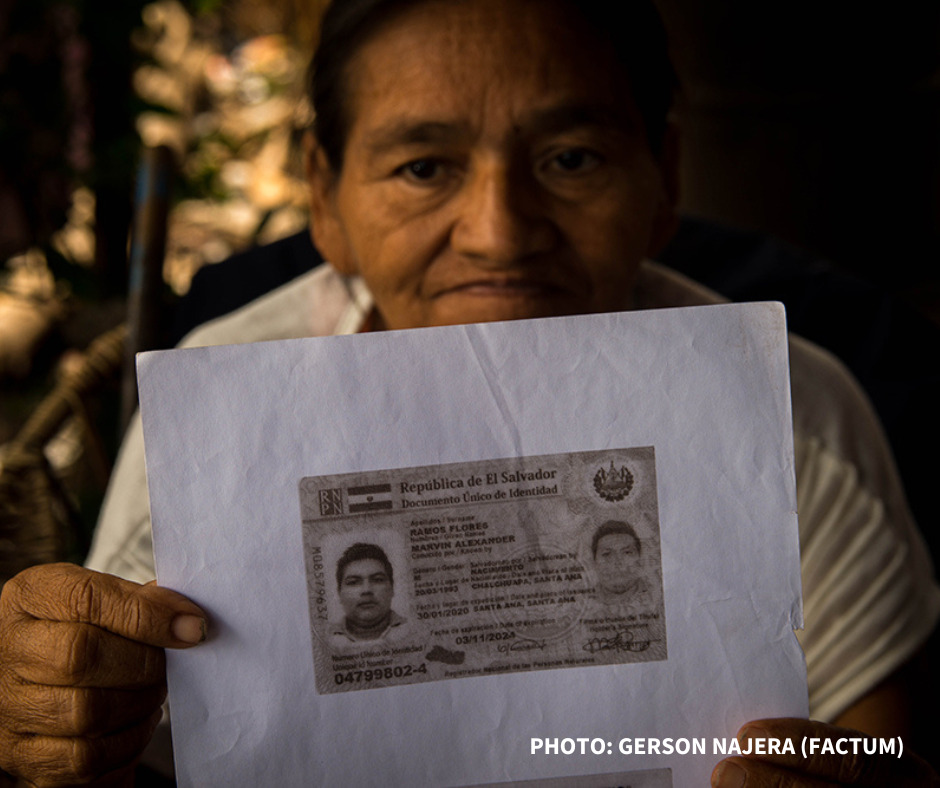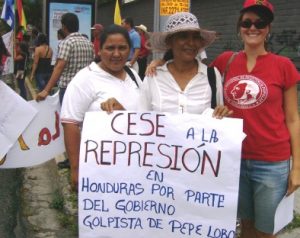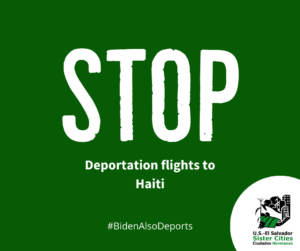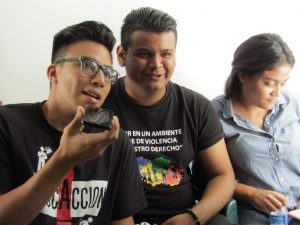Human Rights, Migration, Rights for Youth and Women
Factum: Marvin Alexander Recinos
Being a young person in El Salvador is not an easy thing. Several CRIPDES regionals report of scholarship recipients who have told them they will no longer be part of the programs because they decided to migrate, either because they see no job opportunities, or due to violence or harassment either by gangs or by security forces.
Migration has not stopped this year.
The government of El Salvador decided to extend the State of exception for a third time, despite the reports of Human Rights violations and the (unaddressed) reports of the real reason behind the spike of murders earlier this year. Many people still approve this decision because they perceive this as a measure that is putting gang members in jail. The propaganda machine repeats this message. Last month, the official website of the Legislative assembly stated: “This will be the third consecutive month that El Salvador will have a constitutional measure that will allow the Executive to continue arresting gang members and their collaborators”. The site fails to address why the Salvadoran government has refused to extradite gang leaders wanted by the U.S. government, though.
Gato Encerrado reported that Julissa Mantilla, president of the Inter-American Commission and rapporteur for El Salvador, reported that on June 22, the Salvadoran State sent a note declining its participation in a hearing about these violations, despite having been informed in advance. Mantilla lamented the absence of the State, like other commissioners of the IACHR.
In the middle of these political maneuvers is the reality of many people who have been arrested or have died while in prison, the fear to receive threats or being accused of belonging to gangs if one decides to speak up, and the many mothers looking for their children.
Today we share excerpts of an article of Loida Martinez published by REVISTA FACTUM discussing the situation of one of them, Marvin Alexander Recinos:
Third-year Social Work student Marvin Ramos went to the Lutheran University to speak with one of his professors on April 20, 2022. He wanted to tell Deysi Cheyne, Gender and Society Professor, that he would no longer attend the online classes because he no longer had anyone to lend him a computer, a cell phone, and he also did not have access to Internet. That happened four days before he was captured under the exception regime that has been in force in El Salvador since last March.
(…)
It wasn’t the only thing Marvin told the teacher about him. He also told her that he had sold her camera so he could pay for transportation to take her mother to the hospital, she recalls.
The records of the Lutheran University state that Marvin is a scholarship student thanks to a cooperation agreement that the National Youth Institute (INJUVE) has had with the university since January 20, 2016, which has allowed 12 young people to have access to higher education. This agreement allows scholarship recipients like Marvin to pay half of the fee and INJUVE, a government institution, to pay the other half.
(…)
“He is a very good student, with a clear vision of reality. I greatly admire the tenacity with which he has faced his commitment to university, his career, because despite the severe limitations he maintains his optimism and his dream of graduating as a social worker”, says professor Cheyne.
Factum sought INJUVE’s position on his arrest, through an email and a message sent to the Press Secretary of the Presidency, Ernesto Sanabria, who authorizes all government spokespersons. However, at the time of this publication, no response was received.
When college friends learned of Recinos’ arrest, they raised $220 to buy groceries for Gloria Flores, Marvin’s mother, who has diabetes, kidney damage and poor vision. Receipts for purchases are kept in a desk at Lutheran University.
“Once, a mutual friend had money problems and Marvin shared food with her, from what little he and her mother could already have. He is extremely supportive. Over time I understood the value that he gave to food, ”says a friend of Marvin, who requested that his name not be published because he has received dozens of hate messages for promoting the release of his friend on social media.
Basta de abusos #LiberenAMarvin. Es joven contructor de paz, trabaja acompañando procesos comunitarios. #EstadoDeExcepción no debe violar DDHH, es urgente corregir estas arbitrariedades @nayibbukele @CIDH @OACNUDH @UNYouthEnvoy @unoy_peace @ONU_es @UN4Youth @USAmbSV @MetzTilly https://t.co/FoAbtcq4Qw
— César Artiga (@cartiga_global) April 28, 2022
“Axel”, as Marvin’s friends call him, gave tutoring classes to the children of his neighbors in the Gerardo Barrios community, in the department of Santa Ana, and also supported them to do their homework or to attend their online classes. In gratitude, the neighbors gave him $2 for that action that no one else does in that community.
(…)
Marvin’s mother, Gloria, suffers from diabetes, kidney damage, and poor vision, disabling her for life. To take her to her consultation, he carried her in her arms to the Pan-American highway, along a rough road that gets bogged down every time it rains.
Shortly before his arrest, Marvin had no money to take her to the “San Juan de Dios” hospital in Santa Ana. That is why he sold her camera, the same one that can be seen in the photograph shared by his friends who demand his release. He sold his work tool because his needs were drowning him.
The crime of being poor and living in a community
According to what the Ministry of Security has reported, more than 41,726 people have been arrested during the almost three months of the exception regime approved in El Salvador after the most violent day of the century. The Salvadoran government labels all those captured as “terrorists”; however, relatives and friends of several detainees have denounced irregularities in the procedures, human rights violations, and disassociate those arrested from belonging to criminal groups.
Since March 27, four fundamental rights have been suspended: defense, assembly, inviolability of telecommunications, and the term of detention has been extended. Five social organizations have compiled 1,383 complaints of human rights violations since then; 87.7% of the cases are complaints of arbitrary detentions.
One such organization is Azul Originario, which has established that the majority of those incarcerated are young people who live in poor communities. The security forces use classist and racist criteria, pointing out haircuts, skin color and clothing, to determine who seems suspicious to them, according to this Human Rights organization.
READ THE FULL ARTICLE (IN SPANISH) HERE.




